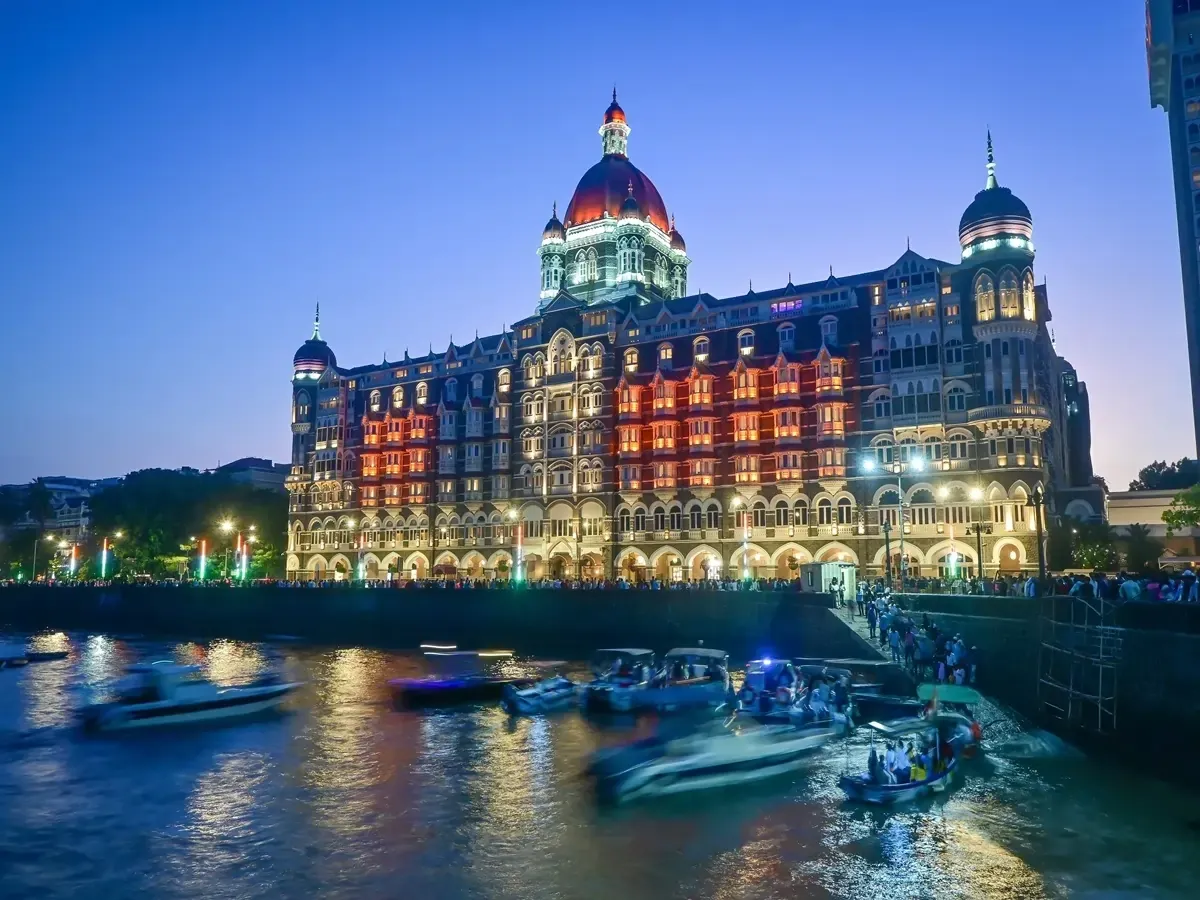Market News
Lemon Tree, SAMHI Hotels, ITC Hotels, IHCL: What lies ahead for hospitality sector after multiple headwinds in 1HFY26?

9 min read | Updated on November 17, 2025, 12:36 IST
SUMMARY
Hotel stocks: Most hotel companies, in their earnings statement, said that the industry faced multiple headwinds during the first half of the year (H1 FY26), including geopolitical tensions, floods, aeroplane accidents, tariff wars, and GST revisions, which resulted in muted demand.
Stock list

The Taj Mahal Palace Hotel at twilight. Iconic Indian luxury hotel in Mumbai. | Image: Shutterstock
It further adds that GDP generated directly by the Travel & Tourism sector (as a percentage of total GDP) lags the global average by 260 bps in CY23, representing a massive opportunity for disproportionate growth of the sector to catch up with global peers.
Echoing similar views, an article by Mordor Intelligence said that the Indian hospitality market size is estimated at $24.23 billion in 2025 and is expected to reach $45.39 billion by 2030, at a CAGR of 13.37% during the forecast period (2025-2030).
Some of the key drivers behind the expected rise in the Indian hospitality market are rising domestic middle-class leisure, government initiatives supporting market growth, budget & mid-scale chain expansion, upgraded pilgrimage circuits driving spiritual & wellness tourism, hybrid-work long-stay demand in hill and beach towns, and e-Visa expansion to 166 countries, shortening booking lead times.
The article by Mordor Intelligence explains that sustained momentum in the industry comes from an expanding middle class whose discretionary spending tilts toward organised accommodation, reinforced by large-scale infrastructure modernisation that improves nationwide connectivity.
Chain operators capitalise on standardised offerings and digital loyalty ecosystems to narrow the historical gap with independents, while asset-light agreements accelerate room additions in untapped Tier-2 and Tier-3 cities.
"Domestic leisure, corporate recovery, pilgrimage flows, and medical tourism jointly diversify demand, cushioning operators against cyclical shocks. Digitalisation reshapes distribution economics as hotels migrate traffic from commission-heavy OTAs to proprietary channels that promise richer first-party data and higher margins," the article adds.
Hence, to sum up, the hotels and related companies are poised for an impressive and sustainable growth in the coming future, thus aiding their stock prices.
Hotel sector: What Q2 FY26 earnings show
Most hotel companies, in their earnings statement, said that the industry faced multiple headwinds during the first half of the year (H1 FY26), including geopolitical tensions, floods, aeroplane accidents, tariff wars, and GST revisions, which resulted in muted demand. However, demand rebounded in September with longer weekends and early festive activity, reaffirming the sector’s medium- to long-term resilience.
Recent policy measures, including GST rate rationalisation and monetary easing, are expected to boost consumer spending going forward.
"Supply-demand mismatch in the hospitality sector is expected to persist in the medium to long term, with demand—particularly in premium and leisure segments—outpacing available inventory. Backed by robust domestic travel, evolving consumer preferences, and continued government focus on tourism infrastructure, the sector remains well-positioned for expansion. The outlook for the second half of FY25–26 remains positive, with strong fundamentals and rising discretionary spending expected to drive business in the hospitality sector," said ITC Hotels, in its investor presentation post Q2 earnings.
The Mordor Intelligence report states that the luxury hotel segment, despite operating from a comparatively smaller base, is anticipated to achieve a significant CAGR of 12.13% by 2030.
In contrast, the mid- and upper-mid-scale segments currently dominate the Indian hospitality market, collectively accounting for 40.87% of the market share. The resurgence of corporate C-suite travel budgets is driving demand for premium offerings, with a particular focus on wellness-orientated packages and exclusive, privacy-centric concierge services.
"The high-end supply pipeline is set to expand with the introduction of prominent luxury brands, including Raffles Ranthambore and Sofitel Legend Sukh Bagh Jaipur, both scheduled to commence operations by 2029," it adds.
ITC Hotels
The company reported a nearly 74% rise in consolidated net profit for the second quarter ended in September at ₹133.29 crore, on higher revenue from operations.
The company, which listed its shares on the stock exchanges earlier this year post its demerger from ITC Limited, had posted a net profit of ₹76.63 crore a year ago.
It also announced the launch of its new premium brand, 'Epiq Collection – Member ITC Hotels Group'.
"This strategic addition to the portfolio is designed to accelerate the company's premiumisation journey by focusing on the conversion of high-quality hotels with new owned and managed properties," ITC Hotels said.
The initial Epiq Collection projects are under development in Puri and Tirupati.
"With this new brand launch, ITC Hotels aims to add about 1,000 keys under Epiq Collection over the medium term, reinforcing its commitment to offering elevated hospitality experiences across India," the company said.
ITC Hotels has a portfolio of 207 hotels – with 146 operational and 61 in the pipeline.
During Q2, the company's revenue from operations stood at ₹839.48 crore during the quarter under review as against ₹777.95 crore in the year-ago period.
Indian Hotels Company Ltd (IHCL)
The Tata Group company's net profit rose 15% in the second quarter of the fiscal year 2025-26, after excluding the one-off exceptional gain of ₹307 crore in the previous year.
Net profit fell 45% when compared with the previous year's earnings after including a one-off gain.
The company's consolidated net profit stood at ₹318.26 crore for the second quarter ended in September.
Its revenue from operations grew 12% year-on-year (YoY) during the July-September quarter under review, to ₹2,040.89 crore. At the same time, Tata Group-owned IHCL's total expenses also increased to ₹1,671.54 crore, from ₹1,502.01 crore seen in the same quarter of the last fiscal.
IHCL, which owns the 'Taj' marquee brand, has two primary revenue segments: Hotel Services and Air and Institutional Catering (TajSATS).
IHCL MD & CEO Puneet Chhatwal stated, "IHCL continued its accelerated growth momentum in the first half of FY2026 with 46 signings to reach a portfolio of 570 hotels and opened 26 hotels, crossing a milestone of over 250 operating hotels in India with over 25,000 rooms."
The CEO shared that under IHCL's strategic partnership with Clarks Group, 14 hotels have been successfully onboarded on its sales & distribution network, and the remaining portfolio is set to migrate to IHCL's brandscape in the coming months.
"In line with our guidance, Taj Bandstand, an iconic development for the Mumbai skyline, has commenced construction post securing necessary approvals.
"On the back of strong industry fundamentals, the outlook for the second half of the fiscal year remains strong with a rebound in corporate travel, a seasonal surge in social events, and global conventions & trade fairs," Chhatwal said.
Further, Chhatwal said, the main reasons for this growth are robust demand, increased management fee income, and the fact that the company's international business is doing better.
Leela Hotels
The Leela Palaces, Hotels and Resorts Ltd on Tuesday reported a consolidated net profit of ₹74.72 crore for the second quarter ended September 30, 2025, on the back of higher revenue.
The company had posted a consolidated net loss of ₹51.17 crore in the corresponding quarter last fiscal year.
Consolidated revenue from operations in the quarter under review stood at ₹310.65 crore as against ₹277.15 crore in the year-ago period, it added.
Commenting on the performance, Leela Palaces Hotels & Resorts Ltd CEO Anuraag Bhatnagar said, "This marks our fourth consecutive quarter of positive PAT, underscoring the strength of our business." RevPAR (revenue per available room) grew 13%, driven by improved occupancy and ADR (average daily rate), with owned hotels posting strong double-digit RevPAR growth across both city and resort segments, Bhatnagar added.
"We remain on track to deliver mid-to-high teens EBITDA growth for FY26, supported by robust operating momentum, strategic initiatives, and continued portfolio enhancements," the CEO said.
Lemon Tree Hotels
In its earnings press release, Lemon Tree said that in Q2 FY26, it recorded its highest-ever Q2 revenue.
"At ₹308 crore, our revenue grew by 8% compared to Q2 last year, and net EBITDA grew 1% YoY to ₹132.4 crore, translating into a net EBITDA margin of 43%, which decreased by 306 bps YoY, primarily due to increased investments in renovation, technology, and a one-time ex gratia payment to employees."
These accounted for 8% of revenue for this quarter; the company expects all three expense heads to reduce to nearly 5% of revenue in FY27 before stabilising at nearly 2% of revenue by FY28 and onwards.
Q2 FY26 recorded a gross ARR of ₹6,247, which increased by 6% YoY. The occupancy for the quarter stood at 69.8%, an increase of 139 bps Y-o-Y. This translated into a RevPAR of ₹4,358, which increased by 8% Y-o-Y.
"The company's profit after tax (PAT) stood at ₹41.9 crore in Q2 FY26, an increase of 20% YoY. Cash profit for the company stood at ₹76.3 crore in Q2 FY26, an increase of 9.2% YoY.
As of September 30, 2025, the total inventory for the group stands at 242 hotels and 20,074 rooms, with 10,956 rooms and 121 hotels being operational and the rest in the pipeline.
SAMHI Hotels
SAMHI Hotels reported strong operating performance and profitability for the quarter and half year ended September 30, 2025.
For Q2 FY26, the company recorded RevPAR growth of 11.2% year-on-year, with total income rising 11.0% to ₹296.3 crore. EBITDA increased 14.2% to ₹110.5 crore, while PAT surged 691.1% year-on-year (YoY) to ₹99.8 crore. For H1 FY26, total income stood at ₹583.6 crore, up 12.0%, with EBITDA up 16.3% and PAT at ₹119 crore, reflecting a 606.3% growth.
During the period, SAMHI accelerated its expansion with two key developments—a landmark dual-branded hotel near the Navi Mumbai International Airport and DY Patil Stadium, and a 260-room midscale hotel in Hyderabad’s Financial District.
Commenting on the results, Ashish Jakhanwala, Chairman & Managing Director, SAMHI Hotels Ltd, said, “With double-digit revenue and EBITDA growth, a strong pipeline, and rising profitability, we’ve set a robust foundation for FY2026 and beyond. Our Navi Mumbai and Hyderabad projects further strengthen SAMHI’s position in key gateway markets.”
Hotel stock performance
Shares of Samhi Hotels have slipped around 1.5% over the past six months, and those of Lemon Tree Hotels have rallied over 13% during the window. Indian Hotels Company (IHCL) shares have slipped over 6.5%, while ITC Hotels have gained 3.53%.
In comparison, the benchmark NIFTY50 index has gained over 4% during the past six months, data show.
Related News
About The Author
Next Story


